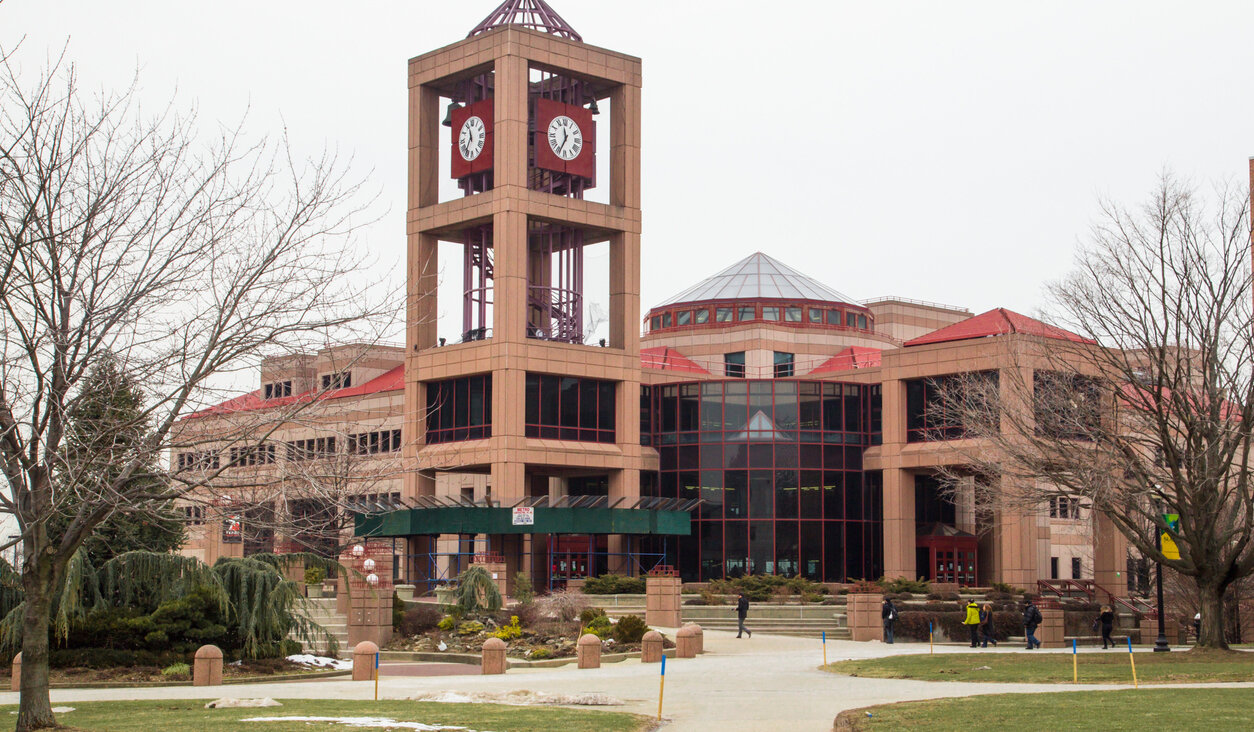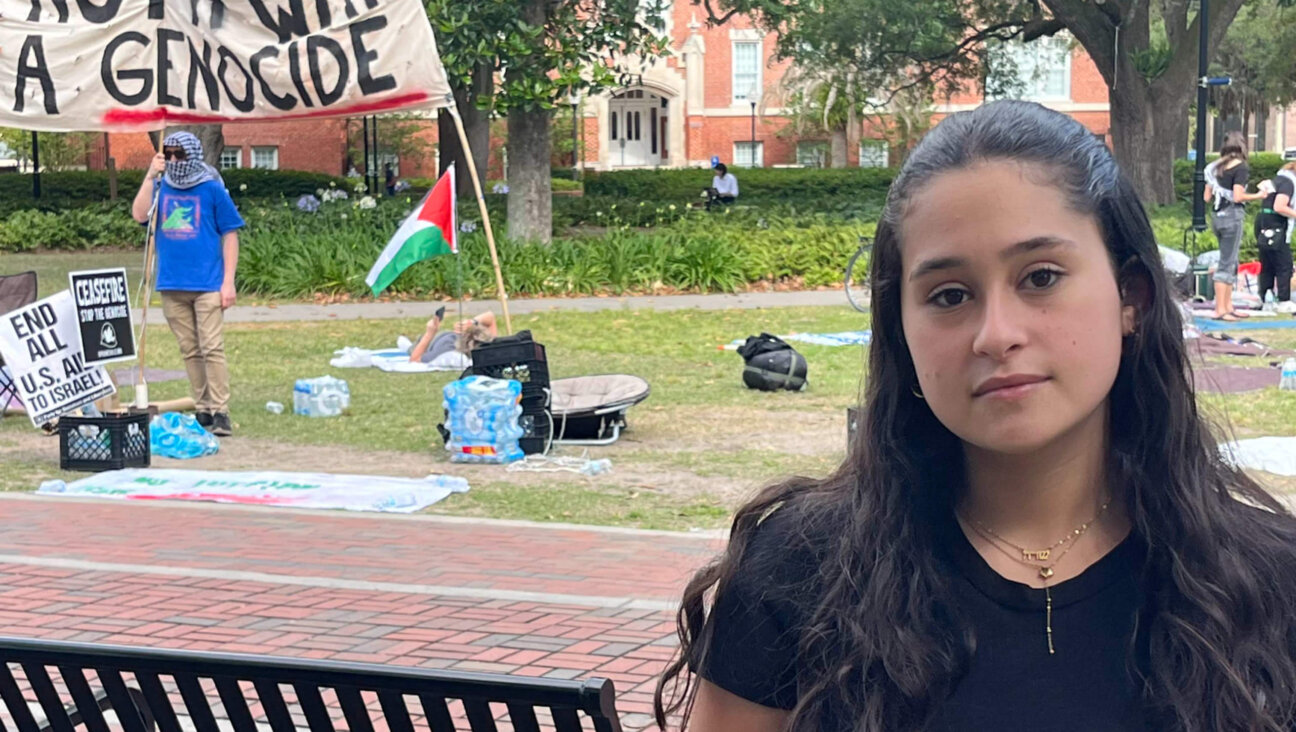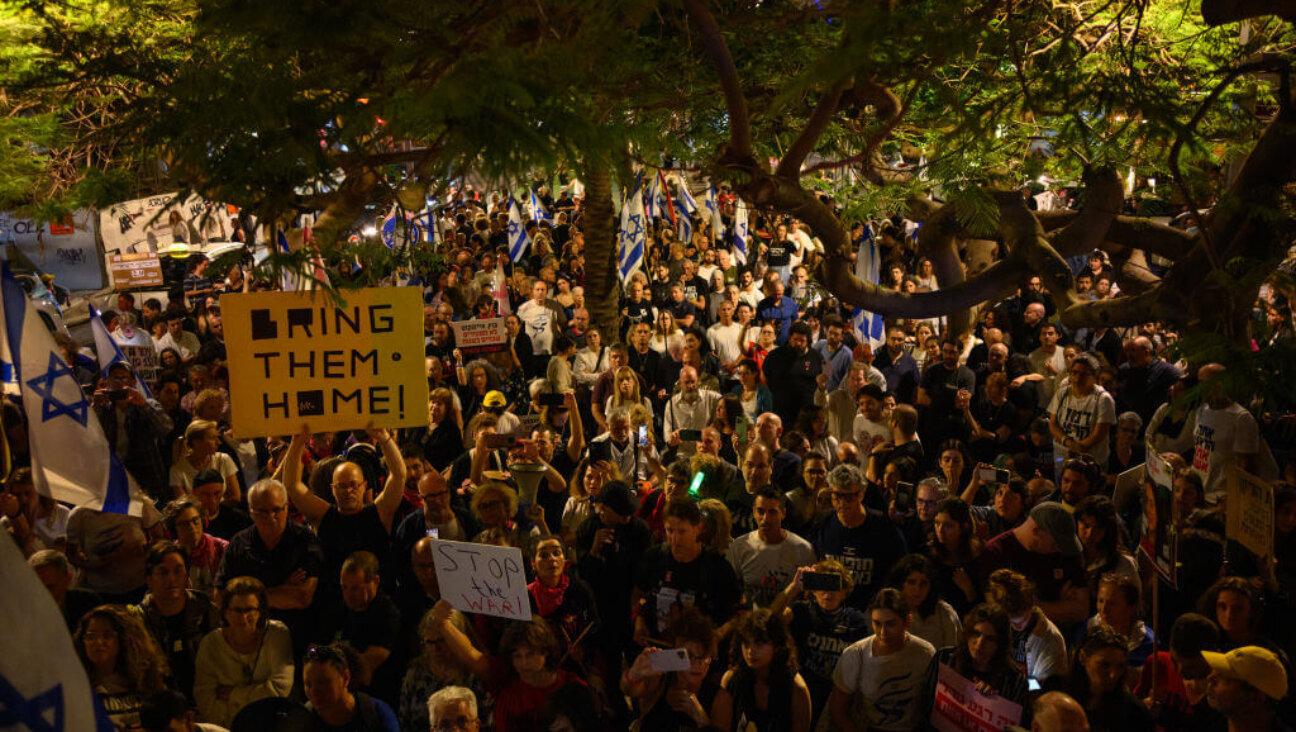‘Ripped in half’: American Jews grapple with how to donate to Israel and Gaza
Many Jews believe Palestinian civilians also deserve help from American Jews — others find such claims offensive or even traitorous
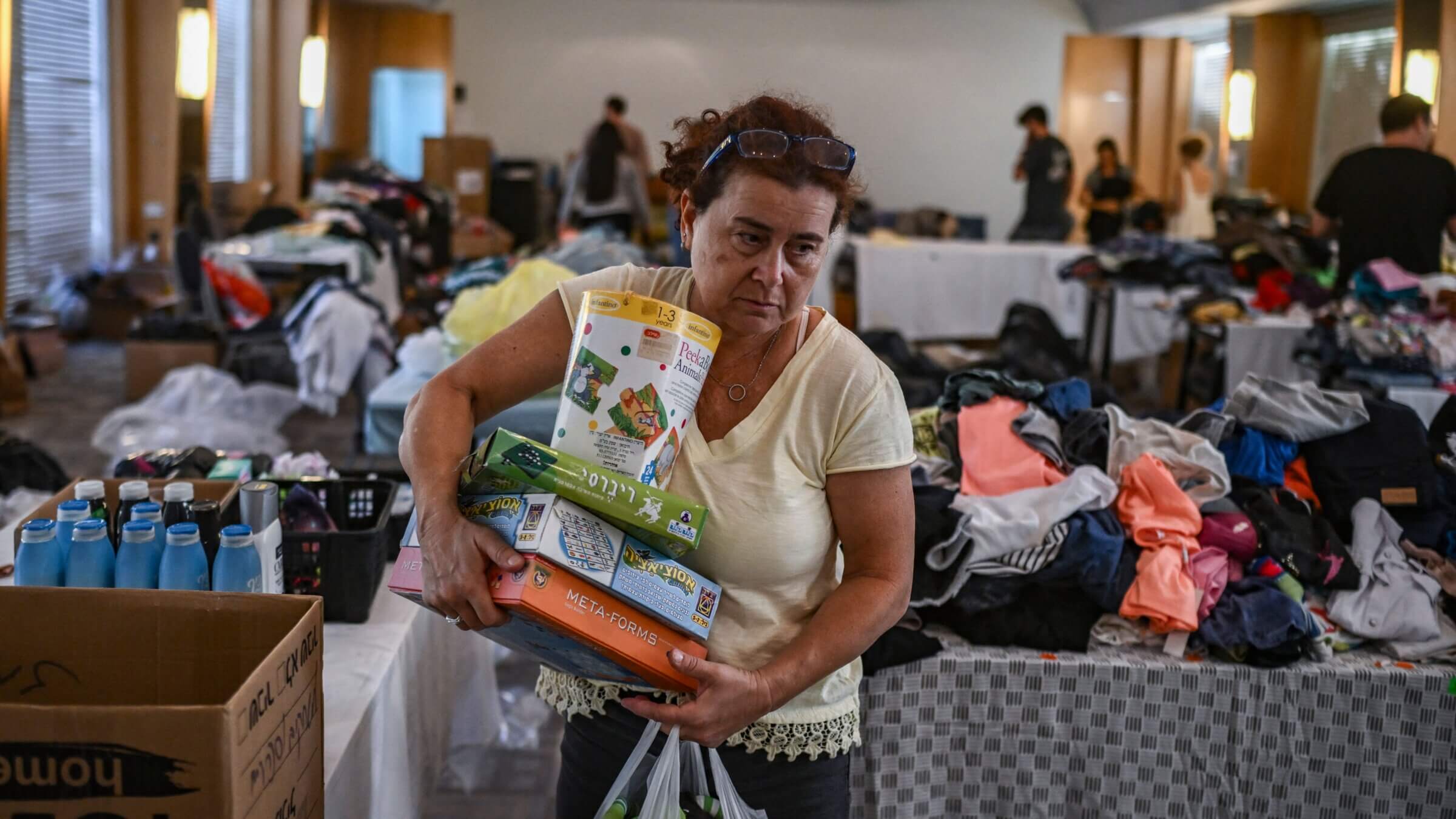
A woman carries donated toys at a hotel in the southern Israeli city of Eilat, which is hosting survivors from the Nir Oz kibbutz near the Gaza border that was attacked by Hamas militants on Oct. 7. Many American Jews have rushed to send donations to the region, sometimes grappling with how to balance helping Israeli and Palestinian victims. Photo by Getty Images
As the person in charge of raising money for the Jewish Federations of North America’s emergency fund for Israel, David Heller is counting progress in the millions — if not tens of millions.
For Heller, the Hamas attack on southern Israel this month is his generation’s defining opportunity to rally toward the Jewish state’s side like many Americans did following the 1967 War or the Yom Kippur War in 1973.
It’s a pitch that is working for Heller in his role as chair of JFNA’s emergency fundraising campaign for Israel, which is close to reaching its $500 million goal.
I spoke to Heller on Friday, a few days after the federations announced that they had raised $388 million over the course of a week.
A few seconds later, Heller revised that upward — “It’s $391 million right now,” he told me from his office in Cleveland, where he works as a real estate developer. Heller clicked around a few more times. “$403 million.”
“I just need people to open up their wallets and give,” Heller said. “It’s really a statement to the people of Israel that we’re here with you — Am Yisrael Chai.”
This clarity of purpose has helped guide Heller’s appeal to both big-dollar funders and thousands of smaller donors who helped the federations funnel an initial $70 million to 45 groups in Israel focusing on medical aid and basic needs for victims of the attack.
“It was immediate,” Paula Bienenfeld, a federal contractor in suburban Maryland, said of her decision to donate to Magen David Adom and Hadassah, which also received money from the federation fund, following the attack.
For other American Jews, the choice of how to donate has been more complicated. In addition to those killed and injured by Hamas, officials in Gaza said Israeli airstrikes have killed 5,000 Palestinians, including more than 3,000 women and children. Many believe they also deserve help from American Jews, while others consider such claims offensive. Some don’t want to send funds that could be used for an Israeli war effort that they don’t support, and others worry that money sent to Gaza could inadvertently help prop up Hamas.
Balancing giving amid accusations of ‘traitor’
Shortly after the Hamas attack on Oct. 7, Miriam Anzovin, a Jewish social media influencer, paused posting her normal content focusing on daily Talmud commentary to share a link for donations to United Hatzalah, a volunteer medical aid group in Israel.
But she soon started sharing charities like World Central Kitchen, which is serving meals to both Israelis and Palestinians in Gaza, or pairing an Israeli medical charity like ZAKA with a similar group working in Gaza, like Anera.

“To me, the idea that you either support humanitarian needs in Israel or in Gaza — but you don’t do both — that didn’t sit right,” Anzovin said in an interview.
Anzovin said that it was difficult to vet charities working in Gaza, and wanted to make sure she didn’t promote organizations that Hamas siphoned aid from, but didn’t accept that as a deterrent. “I had to try harder,” she said.
For her trouble, Anzovin said she has received hate messages calling her a traitor and even some wishing that she had been present at the desert music festival where Hamas militants massacred Israeli civilians.
More common, though, have been messages of thanks. Sometimes these are specific, like followers with deaf family members who were glad to learn about an organization Anzovin highlighted that is helping hard-of-hearing Israelis and Palestinians navigate the war zone.
Other times, she said, people just seem glad to know it is possible to help everyone hurt by the conflict.
“There’s a lot of feelings of being torn in two — being ripped in half – and perhaps people find something healing in the idea that you don’t have to choose which type of human you’re helping,” she said.
Zachary Libow, 34, who works for a record producer in Oakland, California, said he has been grappling with those feelings. Libow previously volunteered as a paramedic in Israel and volunteered to return to the country with EMA Care, an Israeli nonprofit, if the war escalated and more medics were needed.
But he also donated $36 to Anera, which he learned about through Anzovin’s TikTok channel, to help Palestinians in Gaza.
“For my own people — for Am Yisrael — I would put my body on the line,” Libow said. “And for the Palestinians, who I can’t do that for, I put my own money.”
Weighing advocacy against humanitarian aid
Emails pegged to the crisis in Israel and Gaza are flooding the inbox of anyone who has ever engaged with a Jewish organization: Sonja Trauss, a nonprofit worker in Oakland, forwarded me more than a dozen such emails she’s received from organizations as diverse as the Jewish Book Council — “Now, more than ever, we see the vital importance of sharing Jewish stories” — to the progressive New Israel Fund and the Bay Area’s Jewish community relations council, which directed donations to the federations’ central fund.
So far, the only money Trauss has spent in direct response to the conflict was the $7 monthly fee to sign up for the premium version of “The Beinart Notebook,” an email newsletter by Peter Beinart, a liberal Jewish journalist and intellectual.
Trauss, who runs a housing advocacy group, said she paid specifically for access to Beinart’s weekly Zoom chats because she wanted to find like-minded people to process the turmoil with.
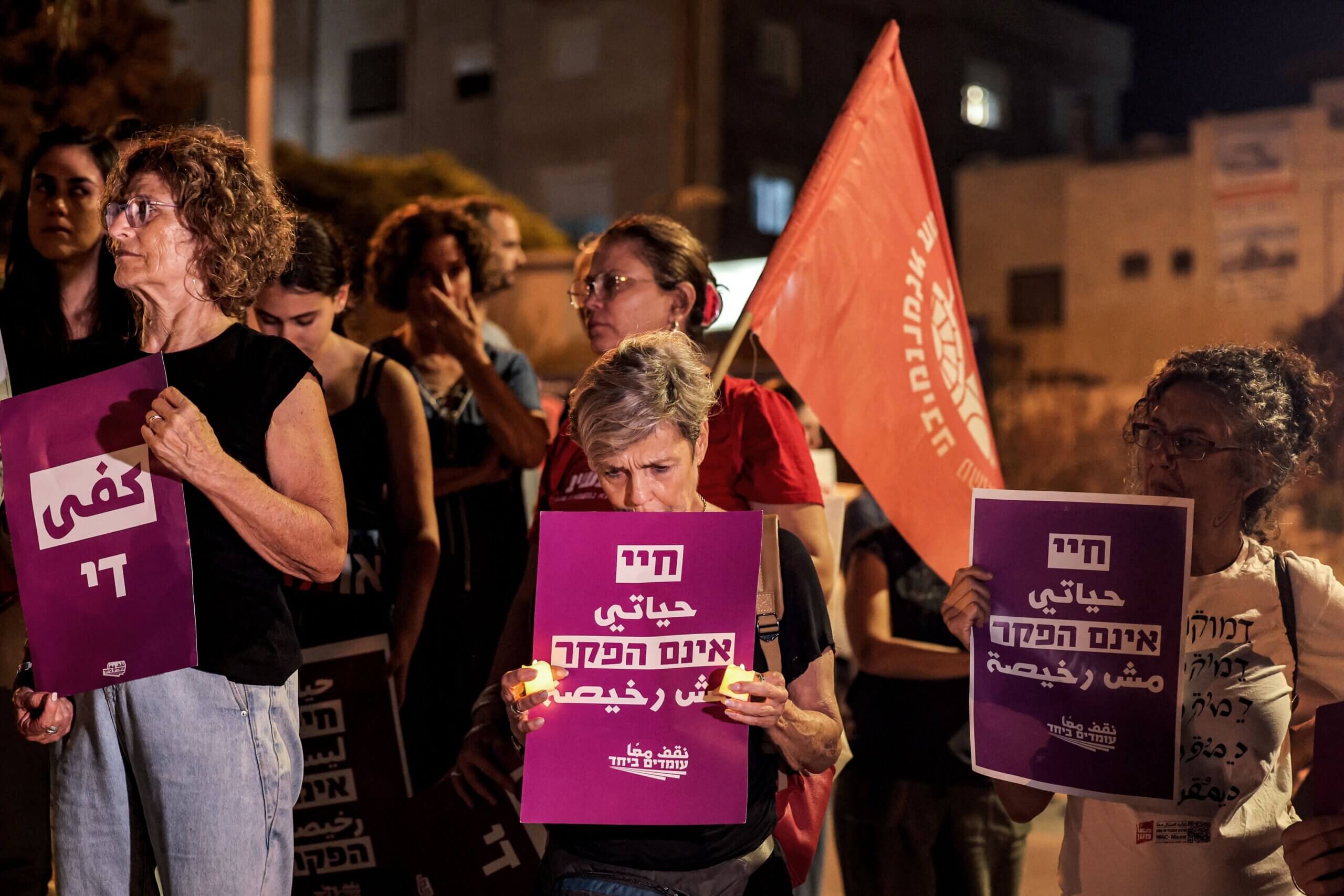
“I’m spending money I hadn’t spent before,” Trauss said. “I just wanted to find other people who were going to be like, ‘What’s next?’”
Orli Matlow, a Jewish comedian living in New York City, said that ads for Doctors Without Borders seem to be following her around social media but that she believes her money would go further if she donated to smaller organizations.
She settled on supporting Standing Together, an Israeli organization that works on “mobilizing Jewish and Palestinian citizens of Israel in pursuit of peace,” and which has seen some of its activities banned by the police since the war in Gaza began.
“They seem to be a solid group that’s doing active work in communities and advocating for a peaceful solution,” Matlow said. “Their leader emphasized that there’s no military solution to this conflict.”
Matlow said she also wanted to support the Israeli left in order to combat the vilification of Israelis by some who consider them all right-wing or racist against Palestinians. “Not everyone in Israel supports Netanyahu or the war,” she said.
Shoshana Baum, an urban planner in Los Angeles, was also drawn to supporting advocacy efforts around the war. Specifically, she said she wanted to support organizations “standing up for Israel’s right to defend itself against Hamas” and “calling out actions and statements happening around the globe that are antisemitic.”
She’s donated to Democrats for Israel Los Angeles and made a first-time contribution to the Hillel at UCLA, her alma mater, “given the attacks on Jews on college campuses.”
Leaders appeal for centralized giving
Heller, the federations fundraising chair, said he understood the appeal of donating to individual organizations that reflect personal preferences over a united fund like the emergency campaign. He acknowledged that he had made at least one such contribution, though asked that the name of the group not be published for fear of distracting from his main job.
But he said that the benefit of donating to the federation fund is that they can vet and parse out money exactly when and how it is needed — making sure no organization gets more than necessary, and that no others have to limit operations for lack of funds.
“All the partners disclose to us how their fundraising efforts are going, what they’re spending on, and then we get them the money,” Heller said. “It’s an open book.”
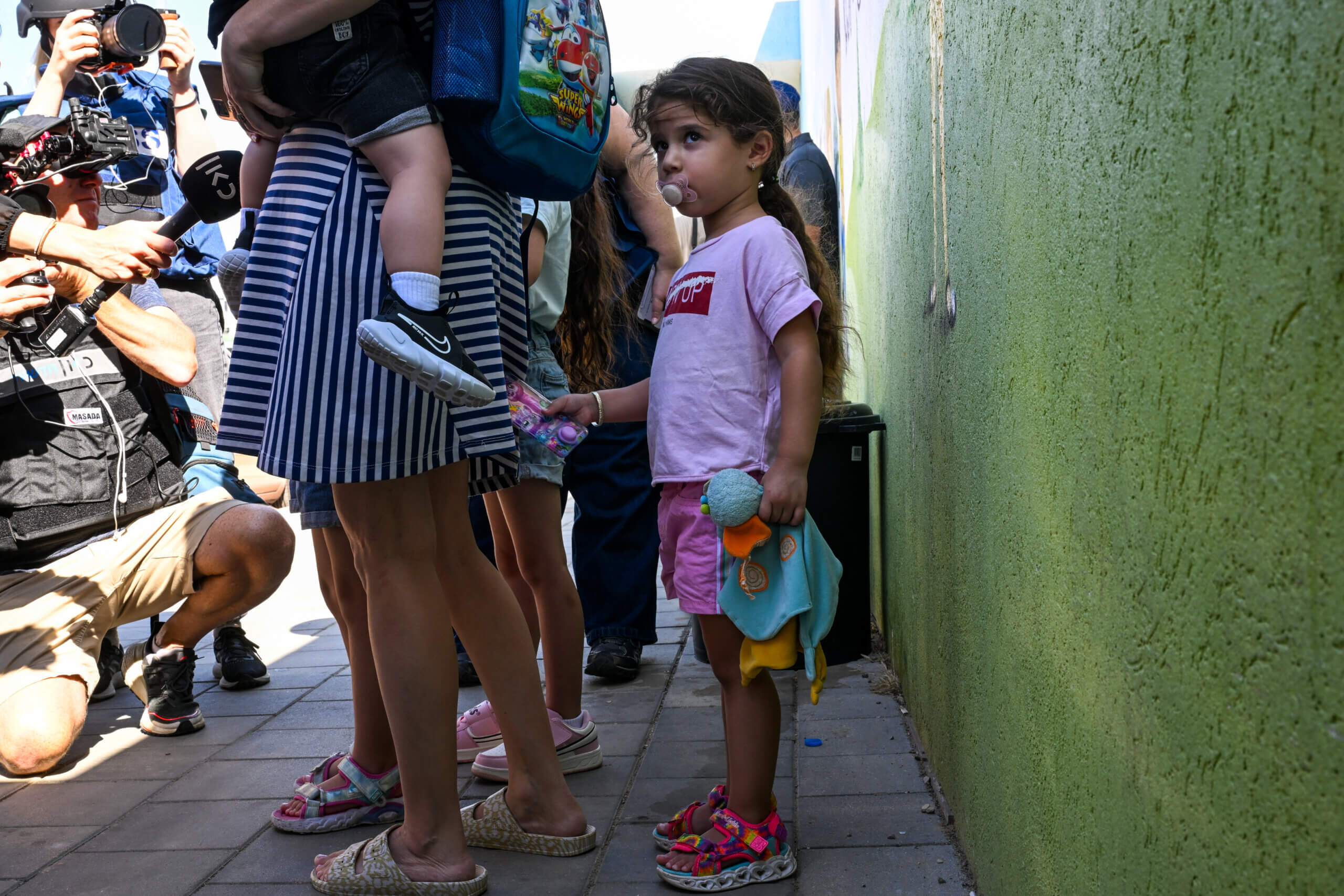
And while the federation’s fund is focused on supporting people in Israel, not Gaza, Heller noted that the federation also works on joint Jewish-Arab projects in the country and that it has allocated money to groups supporting non-Jewish Israelis, including Yanabia, which is building bomb shelters for Bedouin communities in the Negev.
“This is a generation-defining moment,” Heller said. “It will define young leaders throughout the Jewish world — their passion for Israel, their understanding of the need for safety and security for the Jewish people.”
Both Heller and the other American Jews I spoke with emphasized that while figuring out how to direct donations can sometimes feel bewildering, it is also a tangible way to feel connected to a painful crisis thousands of miles away.
“There’s just a general feeling of helplessness for us in the diaspora,” said Libow, the music industry professional. “One of the biggest ways we can make an impact is through our dollars.”
A message from our Publisher & CEO Rachel Fishman Feddersen

I hope you appreciated this article. Before you go, I’d like to ask you to please support the Forward’s award-winning, nonprofit journalism so that we can be prepared for whatever news 2025 brings.
At a time when other newsrooms are closing or cutting back, the Forward has removed its paywall and invested additional resources to report on the ground from Israel and around the U.S. on the impact of the war, rising antisemitism and polarized discourse.
Readers like you make it all possible. Support our work by becoming a Forward Member and connect with our journalism and your community.
— Rachel Fishman Feddersen, Publisher and CEO






